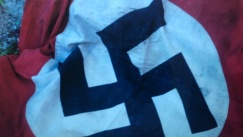For subscribers to WW2History.com we had been planning to add a long essay on Adolf Hitler this month to the Key Leaders section, but because of the interest in last month’s competition on Stalingrad, we’ve decided to add an extraordinary piece of testimony instead. The essay on Hitler will appear next month. Valentina Krutova was […]
WW2 Competitions
| 1 December 2010November Competition result
The memorial to the battle of Stalingrad, overlooking the city. Congratulations to Hannah Scott of County Durham who wins the November WW2History.com competition. She was the first person picked at random from the list of WW2History.com subscribers who gave the correct answer to the question: who commanded the Soviet 62nd Army at the battle of […]
WW2 Relevance
| 19 November 2010Does it matter who becomes King or Queen?
We have no say over who wears the crown. Does it matter? Looking at the interview this week with Prince William and Kate Middleton I thought two things. The first was – what a perfectly nice young couple. The other was – this perfectly nice young couple will become King and Queen one day, and […]
WW2 Relevance
| 12 November 2010Burma, Britain and Betrayal
Burma – or Myanmar as it is called today. A place with a terrible history. The welcome news today that Aung San Suu Kyi, the elected leader of Burma (or Myanmar as it was renamed) may be shortly released from house arrest, does little, unfortunately, to make one think that the appalling crew of gangsters […]
WW2 Controversies
| 5 November 2010An epidemic of racism.
Singapore: ‘the worst disaster in British history.’ We’ve just added to the site for subscribers a video about the Japanese victories at the end of 1941 and the the start of 1942. And as victories go they didn’t come much bigger than the Japanese triumph at Singapore in February 1942, when more than 60,000 troops […]
WW2 Competitions
| 1 November 2010October Competition Result
Congratulations to Mr Atkinson of Northumberland, Mr Fenton of Argyll and Mr Steury of Virginia, USA, who were the first three subscribers selected at random from all of those who got the right answer to October’s WW2History.com’s members competition. A signed, hardback copy of Martin Davidson’s ‘The Perfect Nazi’ is on its way to you. […]
WW2 Relevance
| 26 October 2010Selected news, selected history
Paris last week – distinctly lacking in violence and chaos…. I was in Paris for a few days at the end of last week. But I almost didn’t go, because the newspapers and TV news were full of reports about the mass strikes in France, held in protest at the proposed changes in the retirement […]
WW2 Relevance
| 19 October 2010Resistance to Hitler
Hitler’s bunker at the Wolf’s Lair in wartime East Prussia. In Berlin, in the early evening of 20 July 1944, Ludwig Beck, one of the leading conspirators in the plot against Hitler, posed a vital question to a fellow conspirator, General Friedrich Olbricht. Would the sentries who guarded their resistance headquarters be prepared to fight […]
WW2 Anniversary
| 12 October 2010Invading Russia – the “sensible” option.
The Untersberg – mountain of myth 70 years ago, Adolf Hitler stood on the terrace of his house, the Berghof, above Berchtesgaden in southern Germany, and contemplated this view. The massive Untersberg, directly in front of him, was the mountain in which legend said that the Emperor Charlemagne slept, ready one day to rise again. […]
WW2 Relevance
| 4 October 2010Over sexed and over here.
How can we calculate the cultural impact of the Americans on Britain in WW2? We’ve just added onto the site for subscribers the testimony of Tess Stevens who married an American serviceman she met during WW2 and subsequently moved to the United States. She is also part of a video we’re making about GI Brides […]
 Twitter
Twitter





